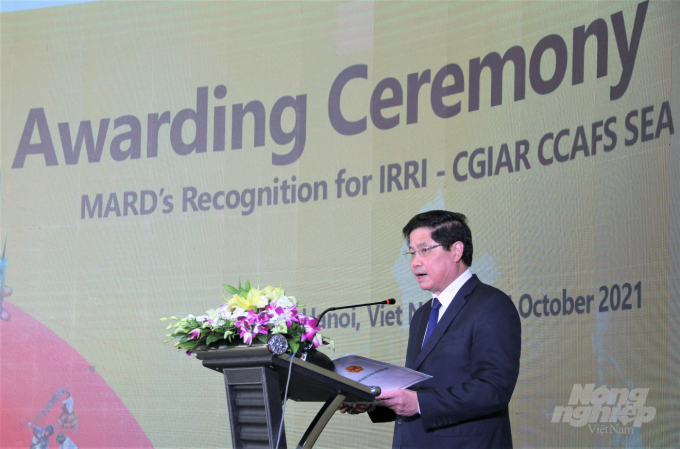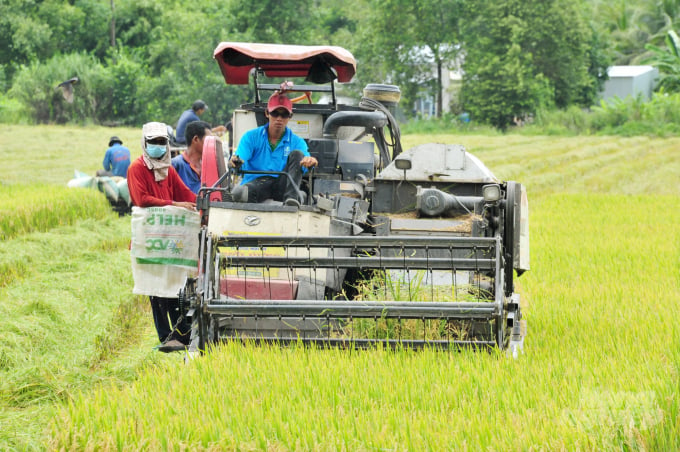May 29, 2025 | 05:30 GMT +7
May 29, 2025 | 05:30 GMT +7
Hotline: 0913.378.918
May 29, 2025 | 05:30 GMT +7
Hotline: 0913.378.918
The activities of the Research Program on Climate Change, Agriculture and Food Security (CCAFS) in Southeast Asia has offered lessons and recommendations for the Vietnamese agricultural sector and farmers in responding and solving climate change challenges.
After its successful ten-year run in the region, the CGIAR Research Program on Climate Change, Agriculture and Food Security (CCAFS) organized the Closing Conference of CCAFS Southeast Asia on 26 October 2021.

Deputy Minister of Agriculture and Rural Development Le Quoc Doanh addresses the awarding ceremony on MARD's Recognition for IRRI-CGIAR CCAFS in Southeast Asia. Photo: Pham Hieu.
Since its inception in SEA in 2013, CCAFS implemented activities promoting climate-smart agriculture (CSA) as a tool to address the increasing impacts of climate change.
Hosted by the International Rice Research Institute (IRRI) – Vietnam Office, CCAFS SEA has done various interventions with its partners in its several priority countries, such as Cambodia, Indonesia, Laos, Myanmar, Philippines, Thailand, and Vietnam.
In the meeting, Dr. Bjoern Ole Sander, IRRI’s Country Representative to Vietnam, shared the advanced rice production technologies such as alternate wetting and drying, low-emissions straw management, and post-harvest management, etc. which reduces GHG emissions while improving productivity and climate resilience.
These techniques have been scaled successfully in the Mekong River Delta region, helping tens of thousands of farmers.
In addition, the innovative tools that IRRI-CCAFS has developed would further contribute to the development of a measuring - reporting - verifying system for GHG emissions in agriculture and support agriculture policy and planning to achieve Vietnam's mitigation commitments in agriculture.
Speaking at the conference, Vietnamese deputy Minister of Agriculture and Rural Development (MARD), Le Quoc Doanh said that the activities of the CCAFS in Southeast Asia had recommended the Vietnamese agricultural sector and farmers in responding and solving climate change challenges via the development and replication of smart agricultural solutions, saving resources, reducing greenhouse gas emissions, increasing the values of crop and livestock production.
As a result, it had contributed to building a high-tech, sustainable and resilient agricultural industry to market and climate fluctuations, said Doanh.

The activities of the CCAFS in Southeast Asia helps promote smart agricultural solutions in Vietnam's agriculture. Photo: Le Hoang Vu.
According to the deputy minister, one of the great achivements of the co-operation between Vietnam’s MARD and the CCAFS SEA was to successfully set up and apply the Climate-Smart Maps and Adaption Plans (CS-MAP) for 43 provinces and cities across the country.
The results of CS-Map application in the Mekong Delta showed that adjusting the sowing schedule had helped farmers avoid the adverse effects of drought and saltwater intrusion that often occur in the winter-spring, the deputy minister said.
The CS-MAP application which was completed and successfully launched at the conference on October 19 were received positively and proposed to continue developing to the district and commune levels and expanding to all 63 provinces.
The Ministry of Agriculture and Rural Development had also shared CS-MAP application at international dialogues and forums within the framework of the United Nations Summit on Food System (UNFSS) and was expected to be introduced at the 26th UN Climate Change Conference of the Parties (COP26) in the United Kingdom.
Doanh also highly appreciated the establishing and implementing seven Climate-Smart Villages (CSV), which served as a multisectoral platform for testing the technological and institutional options for climate change adaptation and mitigation in agriculture.
Translated by To Nhu
/2025/05/25/4127-3-073637_820.jpg)
(VAN) Thanks to the promotion from an FAO-implemented project, vegetable production in greenhouses in Moc Chau has seen strong development, from 1.5 hectares in 2021 to nearly 50 hectares in 2024.

(VAN) FAO has recently supported USD 140,000 to implement the project 'Risk mitigation human-animal interface risks through disease control initiatives in pig farming.'

(VAN) The People's Committee of Tra Vinh province has approved an adjustment to the investment policy for the Green Hydrogen Plant project, increasing its area to approximately 52.76 hectares.
![Reducing emissions from rice fields: [2] Farmers’ commitment to the soil](https://t.ex-cdn.com/nongnghiepmoitruong.vn/608w/files/news/2025/05/05/dsc08881jpg-nongnghiep-140632.jpg)
(VAN) Clean rice cultivation model in Thuong Tan commune, Bac Tan Uyen district, is assisting local residents in achieving sustainable agriculture by substantially reducing costs, increasing productivity, and protecting the environment.

(VAN) At the conference to disseminate Resolution No. 68, AgriS introduced its digital agricultural ecosystem and reaffirmed its commitment to accompanying the Government in promoting private sector development and sustainable agriculture.

(VAN) 'Blue Ocean - Blue Foods' initiative is designed to restore marine ecosystems and establish sustainable livelihoods for local communities by cultivating a minimum of 1,000 hectares of cottonii seaweed in the first three years.
/2025/05/21/4642-3-112707_603.jpg)
(VAN) The V-SCOPE project has made direct contributions to three out of six pillars of the Comprehensive Strategic Partnership between Vietnam and Australia.